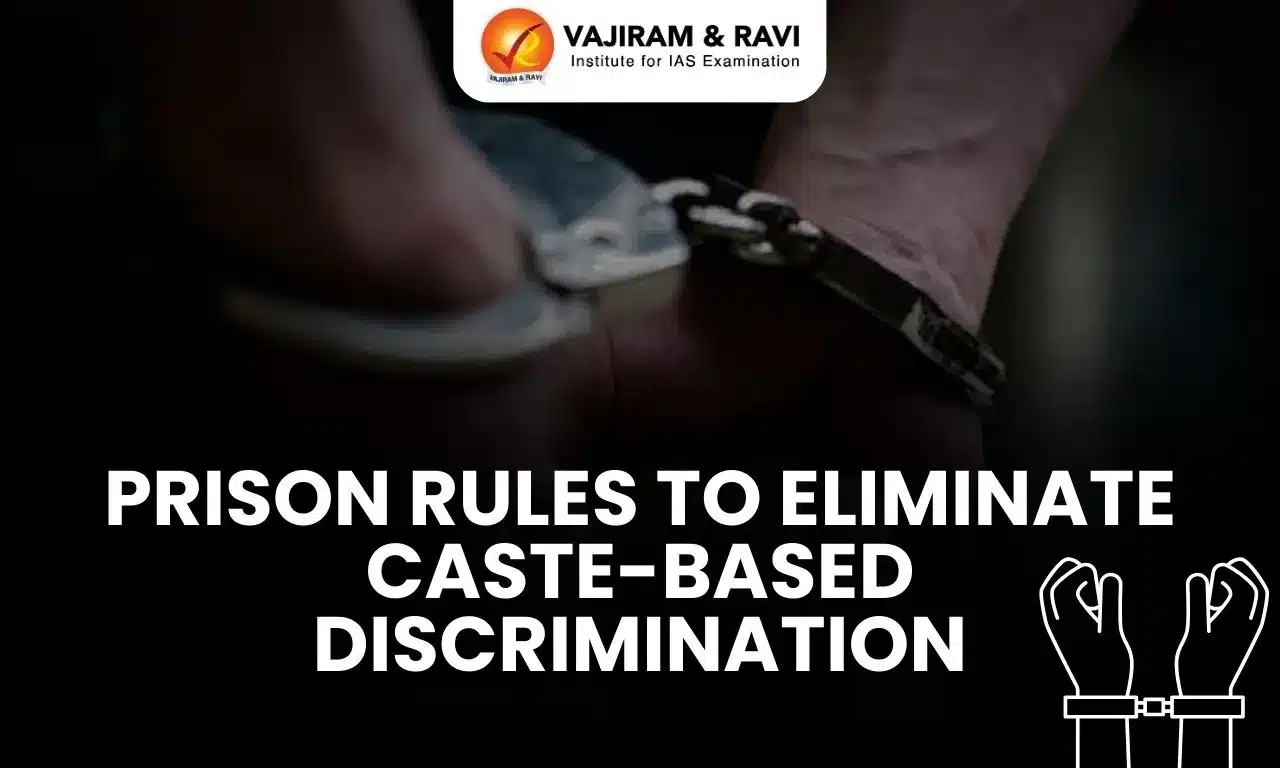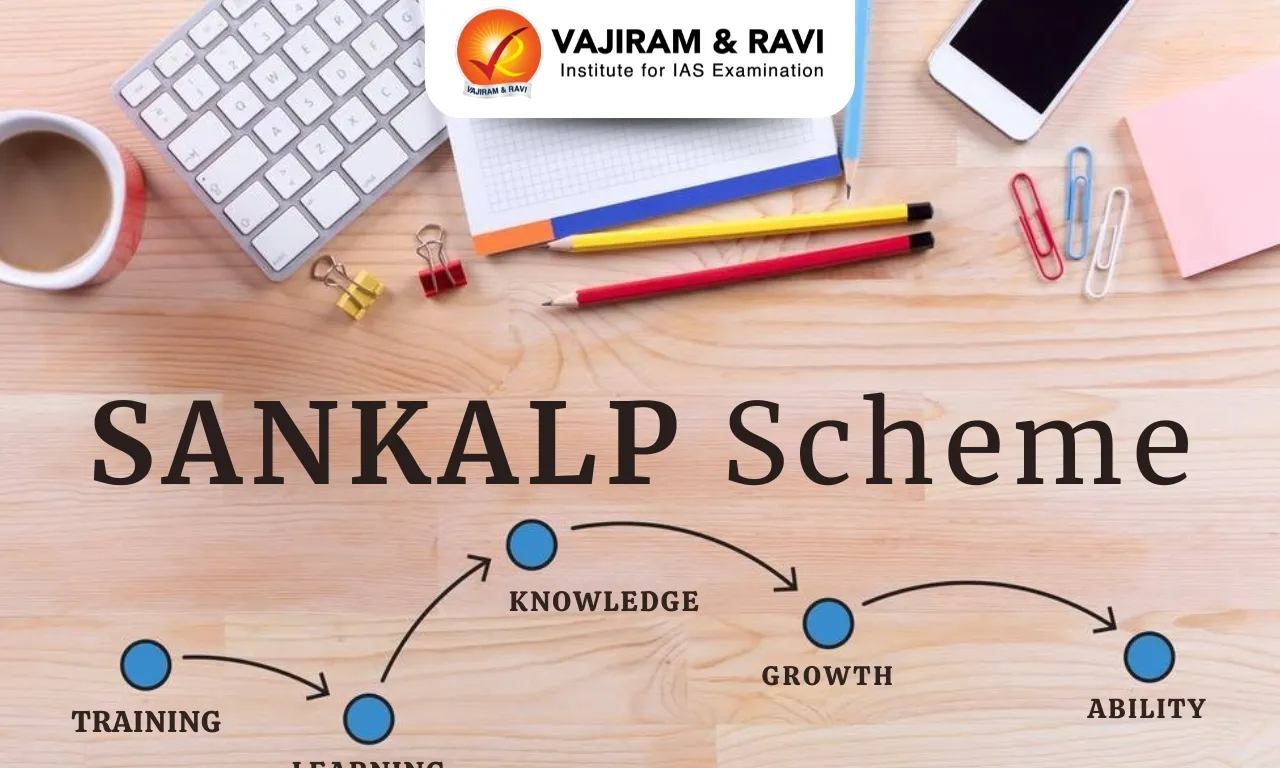What’s in today’s article?
- Why in the News?
- Background
- Addressing Caste-Based Discrimination in Prisons
- Redefining Habitual Offenders
- Significance of the Amendments
- Conclusion
Why in the News?
- The Union Home Ministry has introduced significant amendments to the Model Prison Manual, 2016, and the Model Prisons and Correctional Services Act, 2023.
- The Amendments are aimed at addressing caste-based discrimination and refining the definition and treatment of habitual offenders in Indian prisons.
Background
- The Supreme Court, in its October 3, 2024 ruling, highlighted the persistence of caste-based discrimination and inconsistencies in defining habitual offenders across states.
- It directed governments to update their legal frameworks and ensure equality and fairness in prison administration.
- This judgment forms the basis for the Home Ministry’s comprehensive overhaul of prison rules.
Addressing Caste-Based Discrimination in Prisons
- To eradicate caste-based discrimination within prisons, the following changes have been implemented:
- Prohibition of Discrimination:
- Prison authorities are now mandated to ensure there is no discrimination, classification, or segregation of prisoners based on their caste.
- Duties and work assignments within prisons must be allocated without prejudice, promoting equal treatment for all inmates.
- Legal Provisions in Prison Rules:
- A new section, 55(A), titled ‘Prohibition of caste-based discrimination in Prisons and Correctional Institutions,’ has been added under the Miscellaneous category of the Model Prisons and Correctional Services Act, 2023.
- This ensures a codified framework to eliminate caste-based practices.
- Implementation of Manual Scavenging Prohibition:
- The provisions of the Prohibition of Employment as Manual Scavengers and their Rehabilitation Act, 2013, have been extended to prisons and correctional institutions.
- Manual scavenging and hazardous cleaning of sewers or septic tanks within prisons are explicitly prohibited, safeguarding inmates from degrading practices.
Redefining Habitual Offenders
- The amendments also address the treatment and classification of habitual offenders, following Supreme Court directives to standardize definitions and ensure adherence to constitutional principles:
- Unified Definition:
- A habitual offender is now defined as an individual who, during any continuous period of five years, has been convicted and sentenced to imprisonment on more than two occasions for offences committed on different occasions (not part of the same transaction), provided these sentences are not overturned on appeal or review.
- Time spent in jail under sentence or detention will not be included in the five-year period.
- Legislative Consistency:
- In states lacking specific Habitual Offenders Acts, the Union and state governments are required to align their prison manuals and rules with the Supreme Court’s judgment within three months.
- The amendments aim to create consistency across jurisdictions by replacing varied state definitions of habitual offenders with a standard model.
Significance of the Amendments
- Ensuring Equality:
- The amendments aim to uphold the constitutional right to equality and dignity for all prisoners, irrespective of their caste or background.
- Eliminating Degrading Practices:
- By prohibiting manual scavenging and hazardous cleaning, the rules reinforce humane treatment within prisons.
- Standardized Framework:
- The unified definition of habitual offenders ensures consistent treatment of repeat offenders across states, avoiding arbitrary classifications.
Conclusion
- These amendments mark a significant step toward ensuring a fair and non-discriminatory prison environment.
- By addressing caste-based discrimination and aligning the treatment of habitual offenders with constitutional principles, the Union Home Ministry aims to create a more just and equitable correctional system.
- These changes reflect India’s commitment to human rights and the rule of law, setting a progressive precedent for prison reforms nationwide.
Q1. Is the police under central or state?
‘Police’ and ‘Public Order’ are State subjects under the Seventh Schedule to the Constitution of India and therefore, it is the primary duty of the State Governments to prevent, detect, register and investigate crime and prosecute the criminals.
Q2 What is Central Industrial Security Force?
The Central Industrial Security Force is a federal police organisation in India under the Ministry of Home Affairs. It is one among the Central Armed Police Forces. CISF provides security to over 356 industrial units, government infrastructure projects and facilities and establishments located all over India.
Last updated on February, 2026
→ UPSC Notification 2026 is now out on the official website at upsconline.nic.in.
→ UPSC IFoS Notification 2026 is now out on the official website at upsconline.nic.in.
→ UPSC Calendar 2026 has been released.
→ UPSC Final Result 2025 is expected to be released in the second week of April 2026.
→ Check out the latest UPSC Syllabus 2026 here.
→ Join Vajiram & Ravi’s Interview Guidance Programme for expert help to crack your final UPSC stage.
→ UPSC Mains Result 2025 is now out.
→ UPSC Prelims 2026 will be conducted on 24th May, 2026 & UPSC Mains 2026 will be conducted on 21st August 2026.
→ The UPSC Selection Process is of 3 stages-Prelims, Mains and Interview.
→ Prepare effectively with Vajiram & Ravi’s UPSC Prelims Test Series 2026 featuring full-length mock tests, detailed solutions, and performance analysis.
→ Enroll in Vajiram & Ravi’s UPSC Mains Test Series 2026 for structured answer writing practice, expert evaluation, and exam-oriented feedback.
→ Join Vajiram & Ravi’s Best UPSC Mentorship Program for personalized guidance, strategy planning, and one-to-one support from experienced mentors.
→ Check UPSC Marksheet 2024 Here.
→ UPSC Toppers List 2024 is released now. Shakti Dubey is UPSC AIR 1 2024 Topper.
→ Also check Best UPSC Coaching in India




















